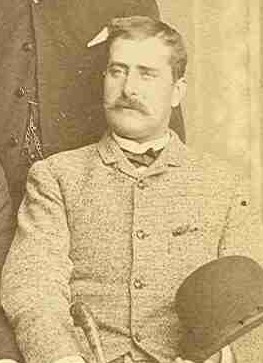Get Today in Masonic History into your Inbox. Sign up today for one of our email lists!
Need an article for your Trestleboard/Newsletter see our Use Policy
David Legge Brainard Passes Away

Today in Masonic History David Legge Brainard passes away in 1946.
David Legge Brainard was an American arctic explorer.
Brainard was born on December 21st, 1856 in Norway, New York. He attended the State Normal School in Cortland, New York before deciding to embark on a military career. He enlisted in the United States Army in 1876, serving in the Montana Territory. He served in three wars against Native American Tribes. This included the Great Sioux War of 1876, also known as the Black Hill Wars, the Nez Perce War between the United States Army and various bands of the Nez Perce tribe and the Bannock War between the United States Army and the warriors of the Bannock and Paiute tribes. He was wounded during the Battle of Little Muddy Creek during the Great Sioux War.
In 1880, Brainard volunteered for and was accepted to the Howgate Expedition, which was to be an exploration of Greenland and was canceled. The following year he became part of the ill-fated Lady Franklin Bay Expedition, which was in the Canadian Arctic. The missions purpose was to establish a meteorological-observation station as part of the First International Polar Year, to collect astronomical data, and polar magnetic data. During the expedition Brainard along with James Booth Lockwood set a new "farthest north record." Brainard and Lockwood went on many excursions from base camp together. Lockwood died in 1884 on the expedition, in his logs Brainard wrote this:
Lieut. Lockwood became unconscious early this morning and at 4:30 p.m. breathed his last. This will be a sad blow to his family who evidently idolized him. To me it is also a sorrowful event. He had been my companion during long and eventful excursions, and my feeling toward him was akin to that of a brother. Biederbick and myself straightened his limbs and prepared his remains for burial. This was the saddest duty I have ever yet been called upon to perform.
Later in 1884, prior to the expedition being rescued, Brainard suffered from scurvy. He did manage to write in log, just before rescue:
Our own condition is so wretched, so palpably miserable, that death would be welcomed rather than feared....
The whole expedition was freezing and starving and by the time rescue reached them and Brainard was one of only six survivors of the expedition. Originally there were 25 members. After Brainard and the other men returned to a hero's welcome, there were rumors the party resorted to cannibalism. An autopsy on one of the bodies seemed to indicate it had happened. The expedition leader, Lieutenant Adolphus Greely denied any knowledge of it and said at no time had he given any authorization for his men to resort to cannibalism. Brainard wrote a book about his time in the arctic called Six Came Back the Arctic Adventure of David L. Brainard.
In 1886, Brainard was commissioned as a Second Lieutenant in the United States Army as recognition for his efforts during the Arctic expedition. A promotion of this nature being rare, made Brainard the only living, active or retired, Army officers promoted for specific services to the Army. During the Spanish American War he served in the Philippines. At the beginning of World War I, he was promoted to brigadier general and served as Military Attaché of the US Embassy in Portugal. In 1919 he retired from military service.
In the 1920's Brainard received various medals for his earlier Arctic explorations. In 1926 he was awarded the Charles P. Daly Medal by the American Geographical Society. In 1929 he was awarded the The Explorers Club Medal, an organization he served as their 4th President.
In 1933, Brainard was awarded a purple heart for his wounds at the Battle of Little Muddy Creek, his was one of only two medals award from the conflicts collectively known as the American Indian Wars.
Brainard passed away on March 22, 1946. He was the last surviving member of the Lady Franklin Bay Expedition.
Brainard was a member of Marathon Lodge No. 438 in Marathon, New York.
This article provided by Brother Eric C. Steele.

